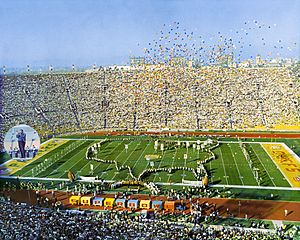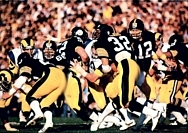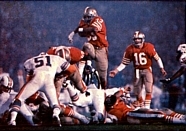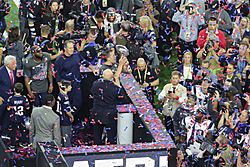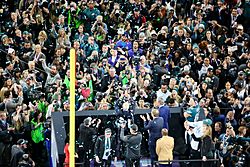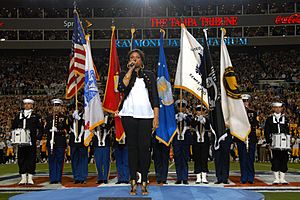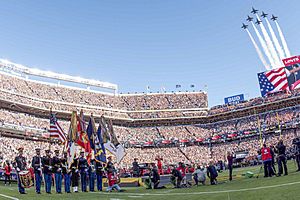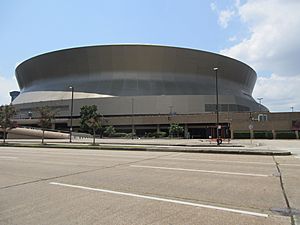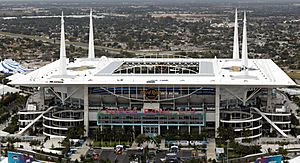Super Bowl facts for kids
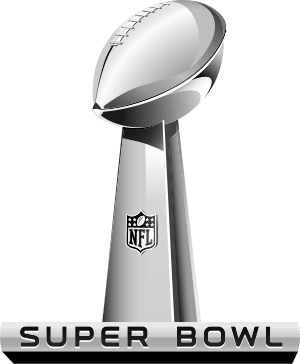
The Super Bowl logo used since Super Bowl XLV in 2011 showcasing the Vince Lombardi Trophy. Since Super Bowl XLV, the Roman numeral of the game has been featured alongside the trophy, with the exception of Super Bowl 50, with the logo decorated in different colors for each year.
|
|
| First played | January 15, 1967 |
|---|---|
| Trophy | Vince Lombardi Trophy |
|
|
|
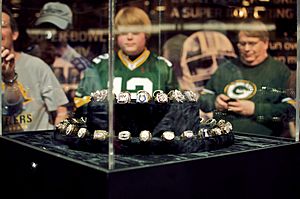
The Super Bowl is the yearly championship game of the National Football League (NFL) in the United States. It has been the final game of every NFL season since 1966. The winning team gets the Vince Lombardi Trophy. This trophy is named after coach Vince Lombardi, who won the first two Super Bowls.
The Super Bowl was created in 1966. This was part of a deal to combine the NFL with another league, the American Football League (AFL). They wanted their best teams to play for a championship. It was first called the "AFL–NFL World Championship Game." The name "Super Bowl" became official in 1969.
After the leagues merged in 1970, the NFL split into two groups: the American Football Conference (AFC) and the National Football Conference (NFC). Since 1971, the Super Bowl has been played between the top team from each of these two groups. The NFC has won 27 times, and the AFC has won 26 times.
Out of the NFL's 32 teams, 20 have won a Super Bowl. The Pittsburgh Steelers and New England Patriots have won the most, with six titles each. The Patriots have also played in the most Super Bowls, with 11 appearances. The Dallas Cowboys and San Francisco 49ers each have five titles and eight appearances. Four teams have never played in a Super Bowl: the Cleveland Browns, Houston Texans, Jacksonville Jaguars, and Detroit Lions.
The Super Bowl is one of the most-watched sports events in the world. It often has the largest audience of any TV show in America each year. The commercials shown during the Super Bowl are very expensive. Companies often create their best ads just for this game. Many people even watch the Super Bowl just to see the commercials! It is also the second-biggest day for food eating in America, after Thanksgiving dinner.
Contents
How the Super Bowl Started
For a long time, college football teams played "bowl games" after their seasons. The first one was the Rose Bowl Game in California, started in 1902. It was called the "Tournament East–West football game." The stadium where it was played, the Rose Bowl Stadium, looked like a bowl. This is how the term "bowl" became popular for big football games.
In 1960, a new league called the American Football League (AFL) started. It competed with the NFL for players and fans. The owner of the Kansas City Chiefs, Lamar Hunt, first used the name "Super Bowl." He said his children were playing with a toy called a "Super Ball," and the name stuck in his head.
The league owners first called it the "AFL–NFL Championship Game." But the media quickly started using "Super Bowl." Even though the league didn't love the name at first, it became very popular. So, starting with the third game, "Super Bowl" became the official name.
Since the fifth game in 1971, Roman numerals have been used to name each Super Bowl. For example, Super Bowl V, Super Bowl LI. The only exception was Super Bowl 50 in 2016, which used regular numbers.
After the NFL's Green Bay Packers won the first two Super Bowls, some worried the AFL wasn't as good. But then, the AFL's New York Jets beat the favored NFL team, the Baltimore Colts, in Super Bowl III. This showed that the AFL teams were just as competitive. The Kansas City Chiefs won Super Bowl IV the next year, proving it again.
In 1970, the NFL reorganized into the AFC and NFC. Now, the champions of these two groups play in the Super Bowl. The winning team receives the Vince Lombardi Trophy. It was named after Vince Lombardi, the coach who led the Packers to win the first two Super Bowls. He passed away in 1970, and the trophy was named in his honor.
Super Bowl Game History
The Super Bowl used to be played in January. But after the September 11 attacks in 2001, games were delayed. This pushed Super Bowl XXXVI to February 3, 2002. Since 2004, the game has been on the first Sunday in February. In 2021, the NFL season got longer, moving the game to the second Sunday in February.
The NFL season starts right after Labor Day in September. There are 18 weeks of regular season games. Then come three weeks of playoff games and one week for the Pro Bowl. The Super Bowl is played the week after the Pro Bowl.
The Pittsburgh Steelers and New England Patriots have won the most Super Bowls, with six each. The Dallas Cowboys and San Francisco 49ers have five wins each. The Packers, Chiefs, and New York Giants have four wins.
The Patriots have played in the most Super Bowls, with eleven appearances. Tom Brady has played in the most Super Bowls as a player (ten) and won the most (seven). Bill Belichick has won the most Super Bowls as a coach (eight).
Eight teams have played in the Super Bowl but never won. The Buffalo Bills played in a record four Super Bowls in a row and lost all of them. The Patriots and Denver Broncos have lost the most Super Bowls, with five defeats each.
The Cleveland Browns, Detroit Lions, Houston Texans, and Jacksonville Jaguars are the only four teams that have never played in a Super Bowl.
Early Super Bowl History: Packers Dominate
The Packers won the first two Super Bowls. They beat the Kansas City Chiefs in 1967 and the Oakland Raiders in 1968. Quarterback Bart Starr was named the Most Valuable Player (MVP) for both games. These wins were part of a great time for the Packers, who won five championships in seven years.
In Super Bowl III, the New York Jets from the AFL surprised everyone. They beat the heavily favored Baltimore Colts from the NFL. Quarterback Joe Namath famously promised a Jets win before the game. This victory showed that the AFL was just as good as the NFL. The Chiefs proved it again by winning Super Bowl IV the next year.
1970s: Rise of Dominant Teams
After the AFL and NFL merged in 1970, three teams became very strong. The Cowboys, Miami Dolphins, and Steelers won eight Super Bowls together in the 1970s. The Steelers won four of them.
The Baltimore Colts won Super Bowl V against the Cowboys. This game is special because a player from the losing team, Chuck Howley, won the Super Bowl MVP award.
The Cowboys won Super Bowl VI against the Dolphins. But the next year, the Dolphins had a perfect season. They won every game, including Super Bowl VII, becoming the only team to do so. They won again in Super Bowl VIII.
In the mid-1970s, the Steelers became a football powerhouse. They won four Super Bowls in six years (IX, X, XIII, and XIV). They had a great coach, Chuck Noll, and amazing players like Terry Bradshaw and their "Steel Curtain" defense. Many of their best players were picked in the 1974 draft. The Steelers are the only team to win back-to-back Super Bowls twice.
The Oakland Raiders and Cowboys each won one Super Bowl in the 1970s. The Minnesota Vikings played in four Super Bowls but lost them all.
1981–1996: NFC Teams Take Over
In the 1980s and 1990s, the NFC teams became very strong. They won 16 out of 20 Super Bowls during these two decades. This included 13 wins in a row from 1985 to 1997.
The San Francisco 49ers were the best team in the 1980s. They had a special offense called the "West Coast offense." It was led by Hall of Fame quarterback Joe Montana and wide receiver Jerry Rice. The 49ers won four Super Bowls in the 1980s (XVI, XIX, XXIII, and XXIV). They were the second team to create a dynasty in the NFL.
Other strong teams in the 1980s included the 1985 Chicago Bears, who had a great season and won Super Bowl XX. The Washington Redskins and New York Giants also won multiple Super Bowls with different quarterbacks. The Raiders were the only AFC team to win Super Bowls during this time.
The Cowboys became strong again in the 1990s. They won three Super Bowls in four years (XXVII, XXVIII, and XXX). They had star players like quarterback Troy Aikman, running back Emmitt Smith, and wide receiver Michael Irvin. The Buffalo Bills made it to the Super Bowl four times in a row but lost all of them.
The 49ers won Super Bowl XXIX, becoming the first team to win five Super Bowl titles. The Cowboys then also reached five titles the next year. The Packers, led by quarterback Brett Favre, won Super Bowl XXXI, their first championship since 1967.
1997–2009: AFC Teams Rise Again
Super Bowl XXXII saw the Denver Broncos beat the Packers. This ended the NFC's 13-year winning streak. The Broncos won again the next year in Super Bowl XXXIII. These wins showed that AFC teams were becoming dominant again. AFC teams won nine out of 12 Super Bowls during this time.
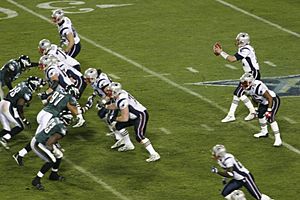
The New England Patriots became the top team in the early 2000s. They won three championships in four years. In Super Bowl XXXVI, quarterback Tom Brady led them to a surprise win over the St. Louis Rams. Brady won the MVP award. The Patriots also won Super Bowl XXXVIII and Super Bowl XXXIX. The Tampa Bay Buccaneers won Super Bowl XXXVII, breaking the Patriots' streak.
The Steelers and Indianapolis Colts continued the AFC's success. They won Super Bowl XL and Super Bowl XLI.
In 2007, the Patriots had a perfect regular season, winning all 16 games. But they lost Super Bowl XLII to the New York Giants, 17–14. The Steelers then won their record sixth Super Bowl title in Super Bowl XLIII.
In 2009, the New Orleans Saints won their first Super Bowl title in Super Bowl XLIV. They beat the Indianapolis Colts.
2010s: Patriots Continue to Reign
The Patriots continued to dominate the AFC in the 2010s. They played in five Super Bowls in this decade. Quarterbacks like Tom Brady, Ben Roethlisberger, and Peyton Manning often led the AFC teams in the Super Bowl.
In Super Bowl XLV (2011), the Packers beat the Steelers. This was quarterback Aaron Rodgers' only Super Bowl win so far.
In Super Bowl XLVI, the Patriots lost to the New York Giants again. This was the Giants' fourth Super Bowl win.
Super Bowl XLVII (2013) was called the "Harbaugh Bowl" because the coaches of the 49ers and Ravens were brothers. The Ravens won, but the game had a power outage that caused a long delay.
Super Bowl XLVIII (2014) was the first Super Bowl played outdoors in cold weather. The Seattle Seahawks won their first NFL title, beating the Broncos.
In Super Bowl XLIX, the Patriots beat the Seahawks in a close game. Tom Brady led a comeback in the fourth quarter. A key play was rookie Malcolm Butler intercepting a pass at the one-yard line. Brady won his third Super Bowl MVP award.
Super Bowl 50 (2016) was the first to use regular numbers instead of Roman numerals. The Broncos, with their strong defense, beat the Panthers. This was Peyton Manning's last game.
Super Bowl LI (2017) was the first Super Bowl to go into overtime. The Atlanta Falcons had a huge lead, 28–3, but the Patriots made an amazing comeback to win 34–28. This was the biggest comeback in Super Bowl history. Tom Brady won his fourth Super Bowl MVP.
In Super Bowl LII (2018), the Philadelphia Eagles beat the Patriots, ending a 57-year championship wait for the Eagles. Nick Foles was the MVP. This was a very high-scoring game.
Super Bowl LIII (2019) was the lowest-scoring Super Bowl ever. The Patriots beat the Los Angeles Rams, 13–3. Tom Brady won his record sixth Super Bowl championship. He also became the oldest player to win a Super Bowl at 41.
2020s: Chiefs Start to Dominate
In Super Bowl LIV (2020), the Chiefs beat the 49ers in a comeback. This was their first Super Bowl title in 50 years. The Patriots did not make it to the Super Bowl this year.
In Super Bowl LV (2021), the Tampa Bay Buccaneers beat the Chiefs. This was a record seventh Super Bowl win for Tom Brady. He also broke his own record as the oldest quarterback to win a championship at 43. The Buccaneers became the first team to play and win a Super Bowl in their home stadium.
A year later, in Super Bowl LVI (2022), the Los Angeles Rams beat the Cincinnati Bengals. They became the second team to win the Super Bowl in their home stadium.
In Super Bowl LVII (2023), the Chiefs came back from a 10-point halftime deficit to beat the Philadelphia Eagles. They won with a last-minute field goal.
In Super Bowl LVIII (2024), the Chiefs won again in overtime. This was a rematch against the 49ers. The Chiefs came back from another 10-point deficit. They won their third Super Bowl in five years and won back-to-back championships.
In Super Bowl LIX (2025), the Chiefs played in their fifth Super Bowl with Patrick Mahomes as quarterback. They lost to the Philadelphia Eagles. The Eagles won 40–22 and stopped the Chiefs from winning three straight Super Bowls. Jalen Hurts was named Super Bowl MVP.
Super Bowl on TV
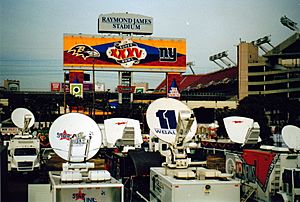
The Super Bowl is one of the most-watched sports events in the world. Most viewers are in the United States. It often has the highest TV ratings in the U.S. More than 100 million people in the U.S. watch the Super Bowl at any given time.
The NFL sometimes says that the Super Bowl has a potential worldwide audience of one billion people. But this means the number of people who could watch, not who actually do. For example, in 2005, about 93 million people watched Super Bowl XXXIX. Most of them (98%) were in North America.
Super Bowl LVII holds the record for the most U.S. viewers, with 115.1 million. The halftime show for that game had 118.7 million viewers.
The Super Bowl is famous for its expensive commercials. Companies pay millions of dollars for a 30-second ad. Some people even watch the game just for the commercials! In 2010, Nielsen reported that 51% of Super Bowl viewers tuned in for the ads.
Since 1991, the Super Bowl has started between 6:19 and 6:40 PM Eastern Time. This makes sure most of the game is shown during prime time on the East Coast.
TV Channels that Show the Super Bowl
The Super Bowl is usually shown by different TV networks each year. These are the same networks that broadcast regular NFL games.
Super Bowl I in 1967 was the only one shown by two networks at once: NBC and CBS. Each network used its own announcers.
After that, NBC showed the game in even years, and CBS in odd years. This continued after the NFL merger. ABC joined the rotation in 1985. Later, Fox also started showing the game. Now, CBS, Fox, NBC, and ABC take turns showing the Super Bowl.
The NFL sometimes changes the rotation. For example, CBS got Super Bowl XXVI in 1992 because they also showed the Winter Olympics that year. This helps networks promote other big events.
The first six Super Bowls were not shown on TV in the host cities. This was because of league rules at the time. But Super Bowl VII in 1973 was shown in Los Angeles as a test.
Shows After the Super Bowl
The Super Bowl has a huge audience, so TV networks often air a popular show or a new show right after it. This is called "lead-out programming." It helps the network get many viewers for that show.
Super Bowl Ceremonies and Entertainment
Early Super Bowls had marching bands perform at halftime. But as the game became more popular, famous singers and musicians started performing. They sing the national anthem, "America the Beautiful", or "Lift Every Voice And Sing".
The U.S. national anthem has been sung at almost every Super Bowl. Since 2009, "America the Beautiful" is sung before the anthem. Since 2021, "Lift Every Voice And Sing" is also sung before "America the Beautiful" to honor Black History Month.
Whitney Houston's performance of the national anthem at Super Bowl XXV in 1991 is considered one of the best ever.
Before the game, the winner of the Walter Payton NFL Man of the Year Award is honored. This award recognizes players for their community work. A former player or celebrity also participates in the coin toss ceremony.
The pre-game ceremonies usually happen in this order:
- "Lift Every Voice and Sing"
- Walter Payton NFL Man of the Year Award presentation
- "America the Beautiful"
- Presentation of the Colors
- "The Star-Spangled Banner" followed by a flyover
- Coin Toss
The Super Bowl halftime show is 30 minutes long. After a TV show caused a drop in viewers during Super Bowl XXVI, the NFL started hiring famous artists. Michael Jackson's performance in 1993 drew more viewers than the game itself. U2's performance in 2002 honored the victims of the September 11 attacks.
The famous "I'm going to Disney World!" ad campaign started at Super Bowl XXI in 1987. The winning quarterback, Phil Simms, was the first to say the line.
Super Bowl Locations
As of Super Bowl LIX, 30 out of 59 Super Bowls have been played in three main areas: Miami (eleven times), New Orleans (eleven times), and Los Angeles (eight times). A city must have an NFL team to host a Super Bowl. The Caesars Superdome in New Orleans has hosted the most Super Bowls, with eight.
Seven Super Bowls have been held in stadiums that were not the home of an NFL team at the time. For example, five of Los Angeles's Super Bowls were played at the Rose Bowl, which is not an NFL team's home stadium. Now, the league prefers to award the Super Bowl to new or recently updated NFL stadiums.
Only two teams have played a Super Bowl in their home stadium and won: the 2020 Tampa Bay Buccaneers in Super Bowl LV and the 2021 Los Angeles Rams in Super Bowl LVI.
The NFL usually does not pick stadiums in cold climates unless they have a roof. Six Super Bowls have been played in northern cities, but most of those stadiums had roofs. MetLife Stadium in New Jersey hosted Super Bowl XLVIII without a roof, but it had a plan for heavy snow.
Sometimes, the NFL has moved the Super Bowl from a city. For example, Super Bowl XXVII was moved from Arizona because the state did not recognize Martin Luther King, Jr. Day as a holiday. When Arizona changed its law, it was awarded Super Bowl XXX.
How Super Bowl Locations Are Chosen
The location of the Super Bowl is chosen by NFL team owners. This usually happens three to five years before the game. The league now picks a possible venue, and that city then creates a proposal.
Here are some things a city needs to host a Super Bowl:
- The stadium must be in a city with an NFL team. It needs at least 70,000 seats. It also needs special equipment for media and electricity.
- There must be space for the "Gameday Experience," a big pre-game party, near the stadium.
- The city needs space for the "NFL Experience," an interactive football theme park, for the week before the game.
- The area around the stadium needs good parking, security, and transportation.
- There must be enough hotels for fans, teams, and media.
- There must be practice fields of good quality for both teams.
The host city usually pays for much of the Super Bowl's cost. New Orleans spent over $1 billion to improve its city before hosting Super Bowl XLVII in 2013.
The NFL also has backup stadiums in case a game needs to be moved at the last minute.
Home Team in the Super Bowl
The "home team" in the Super Bowl switches between the NFC team (for odd-numbered games) and the AFC team (for even-numbered games). The designated "away" team has won more Super Bowls (32 out of 57).
Since Super Bowl XIII in 1979, the home team can choose to wear their colored or white jerseys. Most home teams wear their colored jerseys. However, seven teams have chosen to wear white: the Cowboys (twice), Washington, the Steelers, the Broncos, the Patriots, and the Buccaneers. The Cowboys and Washington often wear white at home. The Steelers wore white after winning three playoff games on the road in white. The Broncos wore white for good luck. The Patriots and Buccaneers also chose white. Teams wearing white jerseys have won 37 out of 57 Super Bowls (65%).
No team has worn a special "third jersey" or "Color Rush" uniform in the Super Bowl.
Super Bowl Host Cities and Stadiums
Sixteen different regions have hosted Super Bowls. New Orleans and Miami have hosted the most, with 11 each.
A total of 27 different stadiums have hosted or will host a Super Bowl. Seven of these stadiums have since been torn down.
| City/Region | No. hosted | Years hosted |
|---|---|---|
| Miami metropolitan area | 11 | 1968, 1969, 1971, 1976, 1979, 1989, 1995, 1999, 2007, 2010, 2020 |
| New Orleans | 11 | 1970, 1972, 1975, 1978, 1981, 1986, 1990, 1997, 2002, 2013, 2025 |
| Greater Los Angeles | 8 (9) | 1967, 1973, 1977, 1980, 1983, 1987, 1993, 2022, 2027 |
| Tampa | 5 | 1984, 1991, 2001, 2009, 2021 |
| Phoenix metropolitan area | 4 | 1996, 2008, 2015, 2023 |
| San Diego | 3 | 1988, 1998, 2003 |
| Houston | 3 | 1974, 2004, 2017 |
| Atlanta | 3 (4)' | 1994, 2000, 2019, 2028 |
| Metro Detroit | 2 | 1982, 2006 |
| San Francisco Bay Area | 2 (3) | 1985, 2016, 2026 |
| Minneapolis | 2 | 1992, 2018 |
| Jacksonville | 1 | 2005 |
| Dallas–Fort Worth Metroplex | 1 | 2011 |
| Indianapolis | 1 | 2012 |
| New York metropolitan area | 1 | 2014 |
| Las Vegas Valley | 1 | 2024 |
Note: Years listed are the year the game was actually played (or will be played; future games are denoted through italics) rather than what NFL season it is considered to have been.
^ ^: Stadium has since been demolished.
^ ‡: Before 2003, the stadium was in an area of Miami-Dade County that was not part of a city.
^ ††: The original Stanford Stadium, which hosted Super Bowl XIX, was torn down and a new stadium built in 2006.
^ ˇ: Future Super Bowls, also shown in italics.
Upcoming Super Bowl Locations
| Year |
Venue | Location |
|---|---|---|
| 2026 | Levi's Stadium | Santa Clara, California |
| 2027 | SoFi Stadium | Inglewood, California |
| 2028 | Mercedes-Benz Stadium | Atlanta, Georgia |
San Diego is the only city that has hosted Super Bowls but no longer has an NFL team. London, England, has also been mentioned as a possible future host city. However, the time difference makes it difficult. A game starting at 6:30 PM in the U.S. would begin at 11:30 PM in London.
Eight stadiums that hosted a Super Bowl no longer exist. They have been torn down.
Super Bowl Name Rules
The NFL works hard to protect its trademarks like "Super Bowl." Because of this, many events not officially connected to the NFL cannot use the name "Super Bowl." They often call it "The Big Game" instead. One funny example is comedian Stephen Colbert calling it the "Superb Owl."
The NFL says that using "Super Bowl" suggests a connection to the league. They even try to limit how the game is shown publicly. For example, they say Super Bowl showings are not allowed in churches or at events that "promote a message." Also, places that are not sports venues cannot show the Super Bowl on TVs larger than 55 inches. Some people think the NFL goes too far with these rules.
In 2006, the NFL tried to trademark "The Big Game" too. But they stopped in 2007 because of protests. This was mainly from Stanford University and the University of California, Berkeley. Their football teams play in a game called "The Big Game" that has been played since 1892.
Images for kids
See also
 In Spanish: Super Bowl para niños
In Spanish: Super Bowl para niños
 | Emma Amos |
 | Edward Mitchell Bannister |
 | Larry D. Alexander |
 | Ernie Barnes |


